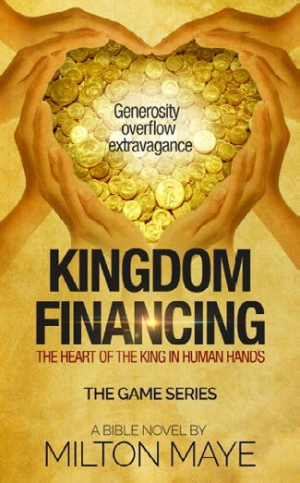Kingdom Financing
A Bible Novel
Based on a singular interpretation of the Bible, the short stories of Kingdom Financing suggest means of improving one’s financial and moral life.
Milton Maye’s biblical short story collection Kingdom Financing uses short narratives to support a faith-based model for improving financial and moral stability.
With the belief that most, if not all, of society’s issues can be remedied through closer adherence to biblical teachings, Maye developed the Caribbean Worship and Devotional Study Bible—a special-format Bible made up of over one hundred stories. Most deal with finances and living a moral life in the face of rampant greed. Each narrative is short, and is either pulled from the Bible or inspired by biblical events. The collection concludes with a summation of its financial and moral lessons.
The tone changes from entry to entry, which leads to a sense of unevenness when the stories are read in quick succession. Some are expressive and boisterous, recalling the work of spirited preachers speaking to large crowds; others are subdued and geared toward individual reflection. Archaic language mixes with modernized English and song lyrics. And the book’s characterizations are light: extrabiblical characters are either unnamed or under introduced.
Many of the stories are repetitive, reiterating concepts like giving the church more money than one saves, and living in accordance with biblical teachings. Only positive examples are emphasized: what happens to those who choose to do otherwise is not covered. The book becomes wearying as its entries repeat their forms, recounting events and then naming the lessons. Spelling and grammatical issues run rampant, undermining the book’s credibility, while the addition of word games near the end of the collection is out of place with the book’s general instructional nature.
Despite the book’s numerous entries, few go beyond the points covered in the concise introduction and epilogue. Many feel unfinished, and the entries increasingly fail to hold interest as the book progresses. In the end, the book’s length ends up being a distraction, impeding its core messages.
There are some standout tales, though, as with one of a girl who decides to donate 90% of her lunch money to a church. She continues the practice for years. When she graduates from high school, she receives financial aid, making it possible for her to attend college for free. However, even this story suggests contradictory takeaways: it attributes the aid to the girl’s impressive GPA and hard studying, despite its earlier focus on the rewards of her donating to the church.
Based on a singular interpretation of the Bible, the short stories of Kingdom Financing suggest means of improving one’s financial and moral life.
Reviewed by
John M. Murray
Disclosure: This article is not an endorsement, but a review. The publisher of this book provided free copies of the book and paid a small fee to have their book reviewed by a professional reviewer. Foreword Reviews and Clarion Reviews make no guarantee that the publisher will receive a positive review. Foreword Magazine, Inc. is disclosing this in accordance with the Federal Trade Commission’s 16 CFR, Part 255.

